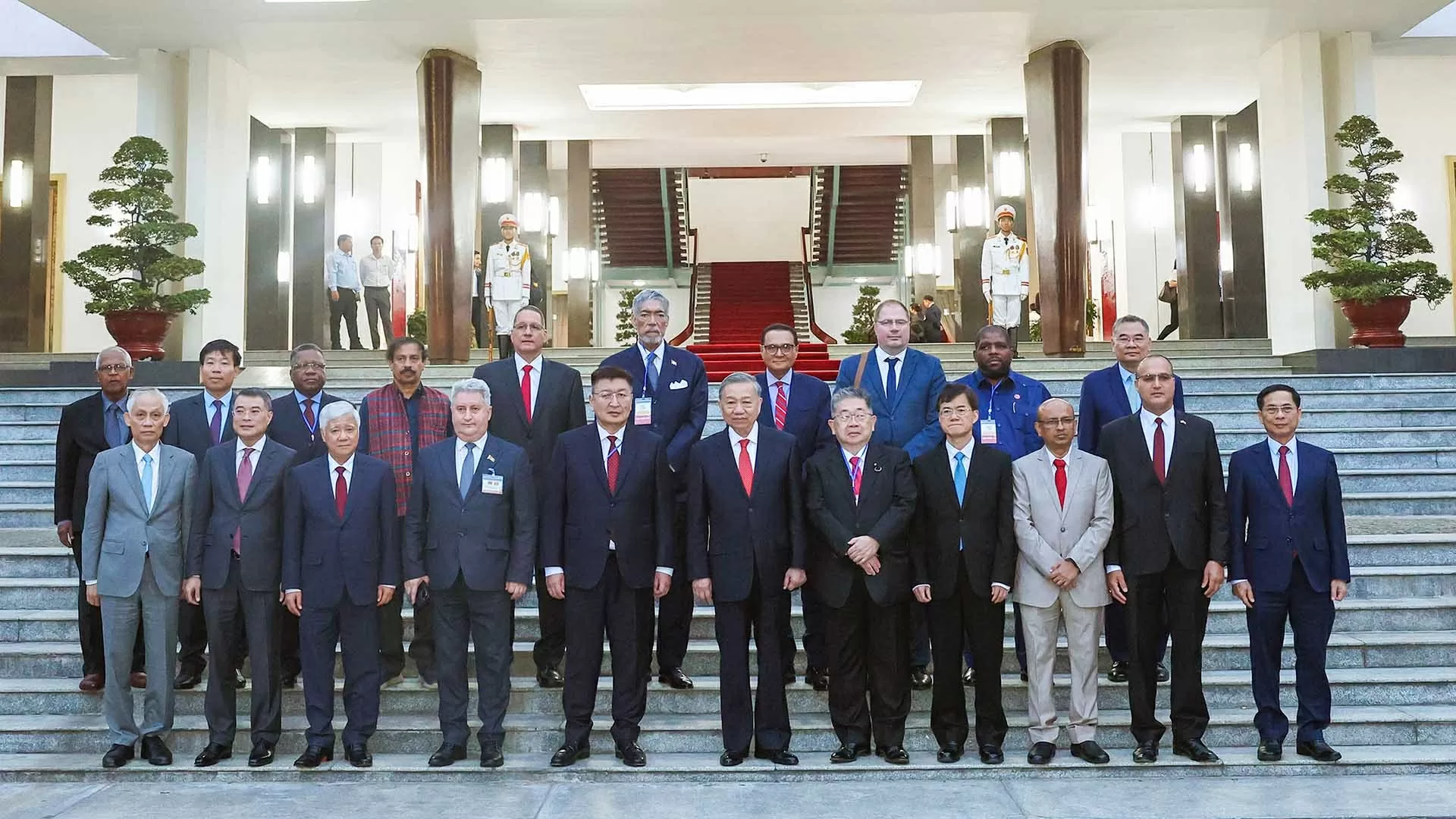 |
| General Secretary To Lam received heads of political party delegations from various countries on the occasion of their visit to Vietnam to attend the 50th anniversary of the Liberation of the South and National Reunification Day in Ho Chi Minh City, April 29. (Source: VNA) |
This is also the first Congress of the newly established Party Committee after the Ministry of Foreign Affairs merged with the Central Foreign Affairs Commission and took over part of the functions and tasks of the National Assembly's Foreign Affairs Committee.
The Congress takes place in the context that the whole country is holding Party Congresses at all levels, preparing for the 14th National Party Congress - the Congress marking the historical starting point of a new era, an era of the Vietnamese nation's rise. Therefore, this Congress of the Party Committee of the Ministry of Foreign Affairs is of great significance.
In particular, the Congress will propose directions, policies and solutions to synchronously and effectively deploy comprehensive and modern diplomacy on all three pillars of Party diplomacy, State diplomacy and people-to-people diplomacy, fulfilling the noble mission of contributing to bringing the country into the era of national advancement.
The close coordination of three pillars contributes to the revolutionary cause of the nation.
In our country's revolutionary practice, party diplomacy, state diplomacy and people's diplomacy have been formed, developed and closely coordinated with each other over the past century, accompanying the process of fighting for independence, national unification, breaking the siege, innovation and international integration.
Right from the first days of leaving Nha Rong port to find a way to save the country, President Ho Chi Minh had many contacts and exchanges, taking advantage of the support and experience of international friends for the struggle of the Vietnamese people, forming the basic features of people's diplomacy during the journey through nearly 30 countries and four continents.
With the establishment of the Communist Party of Vietnam in 1930 and then the Democratic Republic of Vietnam in 1945, party foreign affairs and state diplomacy have made strong developments, continuing to be closely linked with people's foreign affairs, forming a three-legged position, gaining maximum international support, becoming an important force for the struggle for national liberation and national unification, while also creating a unique identity of diplomacy in the Ho Chi Minh era.
The smooth and synchronous coordination of party diplomacy, state diplomacy and people-to-people diplomacy is both a precious tradition and a unique art of Vietnamese diplomacy. Each pillar has its own role, force, method, implementation tools and comparative advantages, creating a combined strength for comprehensive and modern diplomacy.
In implementing the foreign affairs activities of the Party and State, Party foreign affairs is the work of the entire Party, the entire political system, Party committees at all levels and Party members; State diplomacy is the work of agencies in the State system, the Government, and the National Assembly; People's foreign affairs is the work of the Fatherland Front, unions and people's organizations with foreign partners.
Thanks to the close coordination between all three pillars of foreign affairs, during the period of struggle for national liberation and reunification, we mobilized great and widespread support from countries, fraternal parties and peoples around the world to support Vietnam in the resistance war against colonialism and imperialism.
After the country was unified, the uniform deployment of all three pillars played an important role in breaking the siege and embargo, gradually building a favorable foreign relations situation for the country's reconstruction and development. During the Doi Moi period, the coordination of all three pillars helped Vietnamese diplomacy become one of the pioneering forces, leading the way to bring the country into the region and the world.
Under the wise and talented leadership of the Politburo and the Party Central Committee, depending on the situation and circumstances, sometimes we promote this pillar, sometimes we have to implement another pillar... but at any stage, the combination of all three pillars is always a prerequisite to ensure the success of foreign affairs, because the highest goal is to ensure national interests, for independence, peace, stability and development.
Currently, the State of Vietnam has diplomatic relations with 194 countries, and has comprehensive strategic partnerships, strategic partnerships, and comprehensive partnerships with 37 countries. The Communist Party of Vietnam has relations with 259 political parties in 119 countries, including nearly 100 Communist Parties, over 60 ruling parties, and about 40 political parties.
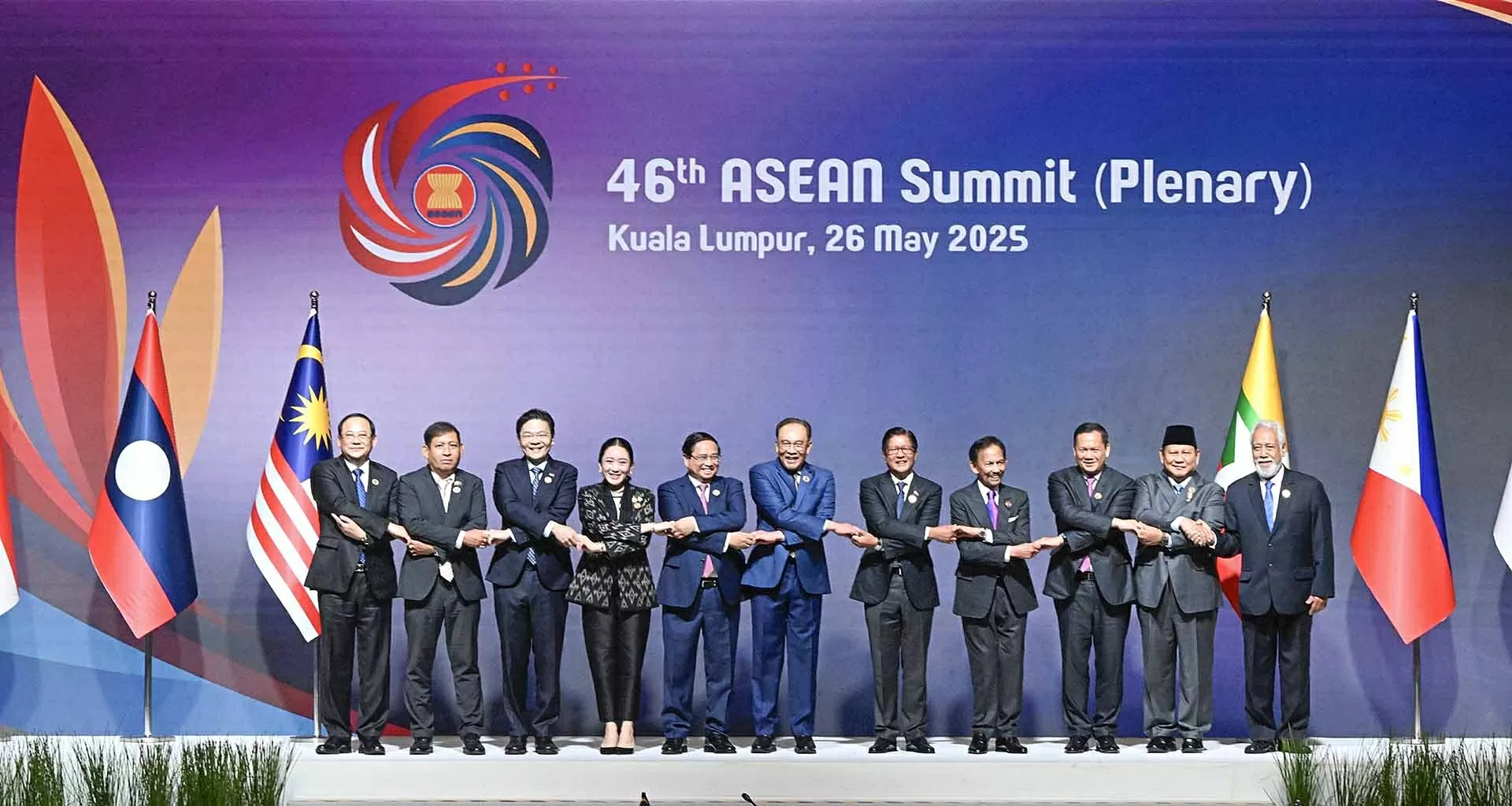 |
| Prime Minister Pham Minh Chinh and other leaders attended the plenary session of the 46th ASEAN Summit in Kuala Lumpur, Malaysia on May 26. (Source: VNA) |
Vietnamese socio-political organizations and people's organizations have also established friendly and cooperative relations with thousands of partner organizations around the world. In recent times, many important foreign affairs activities of the Party and State leaders have been implemented with the "3 in 1" formula, thereby enhancing political trust and multifaceted cooperation with political parties, countries and people of other countries.
In this context, Vietnamese diplomacy has created a favorable foreign situation, making an important contribution to maintaining a peaceful and stable environment for development, together with national defense and security to firmly protect the independence, sovereignty and territorial integrity of the Fatherland, and constantly improving the country's position in the international arena.
Further strengthen the combined strength of the three pillars in the new period
The merger of the Ministry of Foreign Affairs with the Central Foreign Affairs Commission and the taking over of part of the functions and tasks of the National Assembly's Foreign Affairs Committee is the correct policy of the Party and State on building a streamlined, strong, efficient, effective and efficient apparatus, and is also a further realization of the historical coordination of the three pillars of Party foreign affairs, State diplomacy and people's diplomacy.
Accordingly, the Party Committee of the Ministry of Foreign Affairs and the Ministry of Foreign Affairs have become the sole focal point for foreign affairs advice for the Party and State, and are also the agencies responsible for organizing, implementing and uniformly managing foreign affairs activities.
Under the close, timely and comprehensive leadership and direction of the Party Committee of the Ministry, the Ministry of Foreign Affairs has seriously implemented the process of restructuring the apparatus, receiving and deploying new functions and tasks, thereby promoting new roles, functions and tasks, and improving the effectiveness of coordination between the three pillars of Party foreign affairs, State diplomacy and people's diplomacy.
Looking back at history, it can be seen that in each stage of the Revolution, Vietnamese diplomacy has made valuable and timely contributions, and has excellently fulfilled the requirements, tasks and missions assigned by the Party, State and People in each period. Today, in the journey of the entire nation preparing to enter a new era, Vietnam's comprehensive diplomacy carries within it a glorious mission.
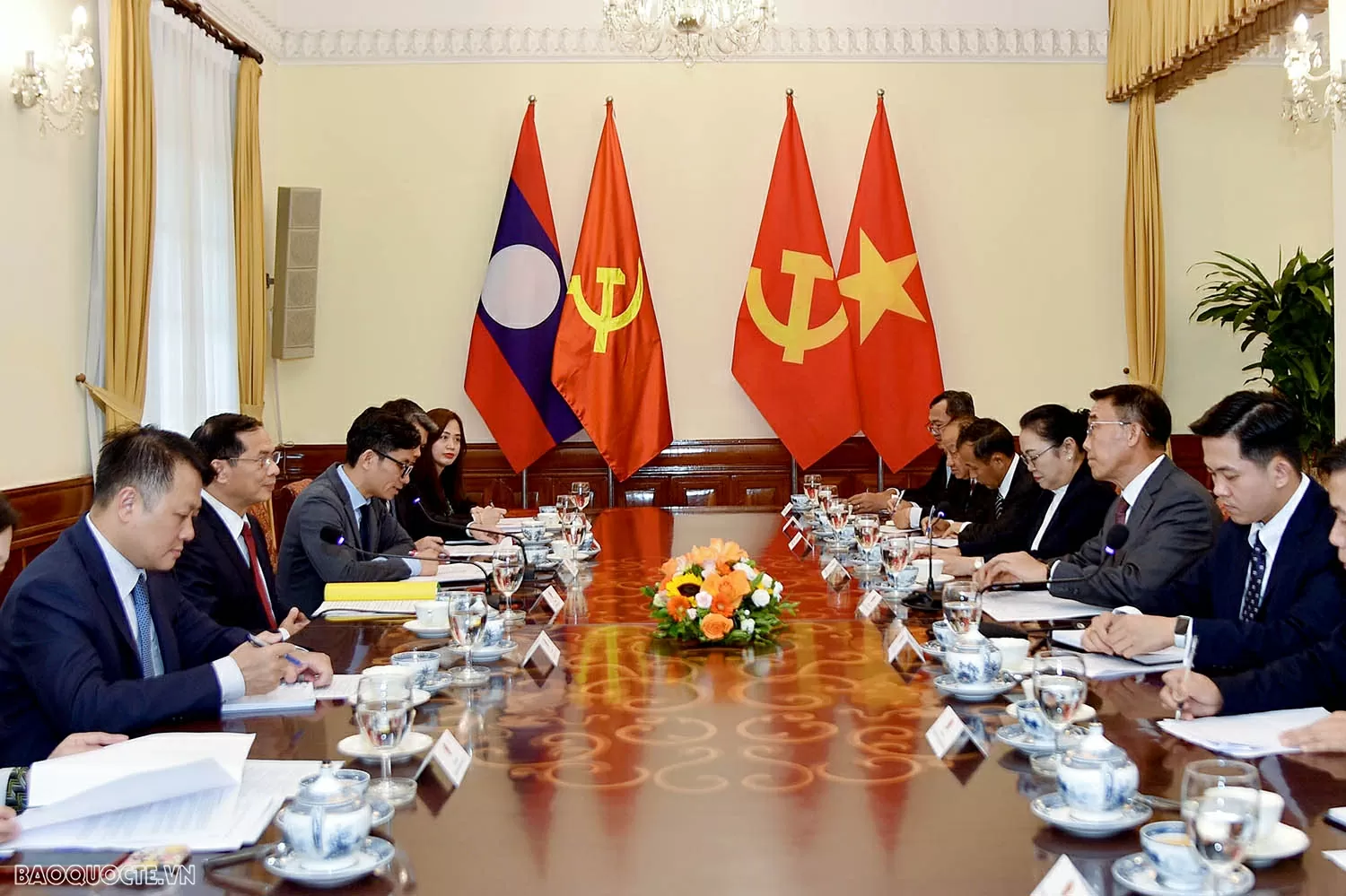 |
| Deputy Prime Minister and Minister of Foreign Affairs Bui Thanh Son held talks with Acting Head of the Lao Central Committee's Foreign Affairs Commission Bounleua Phandanouvong in Hanoi on June 2. (Photo: Quang Hoa) |
That is to contribute to the successful implementation of the country's strategic goals, especially proactively and actively maintaining a peaceful and stable environment; creating strategic space and favorable conditions for the implementation of the country's development goals by 2030 and 2045, contributing to the country's rise, standing shoulder to shoulder with the world powers as President Ho Chi Minh always wished. With that responsibility and mission, in order to further improve the effectiveness of implementation and coordination between the three pillars of foreign affairs, the Party Committee of the Ministry of Foreign Affairs determined that it is necessary to focus on the following major orientations:
Firstly, to raise awareness of the role, position and importance of all three pillars of foreign affairs in Vietnam's comprehensive and modern diplomacy. The merger of the Central Foreign Affairs Commission with the Ministry of Foreign Affairs is to unify direction, management and implementation, making party foreign affairs and people's foreign affairs increasingly closely linked, accompanying state diplomacy. This awareness needs to be thoroughly understood throughout the entire political system, from the central to local levels, people, businesses, and especially the entire team of cadres, civil servants and public employees working in foreign affairs.
Second, to fully exploit and promote the unique strengths of each pillar, for the common goal of ensuring the highest national interests. In particular, party foreign affairs promote the role of strategic orientation, especially in relations with neighboring countries and socialist countries; state diplomacy takes the lead in institutionalization and implementation; people-to-people diplomacy firmly consolidates the social foundation of relations with partners.
Third, in addition to implementing state diplomatic activities, maintain the inheritance and continuity of direction and implementation of party foreign affairs and people-to-people foreign affairs activities, and do not let the restructuring of the apparatus interrupt or create gaps, especially in relations on party and people channels with partners.
Fourth, urgently promulgate, supplement and amend regulations and rules for unified management of foreign affairs activities in the new situation; systematize and rebuild the organization, implementation and coordination processes between the three foreign affairs pillars at both central and local levels in the context of central agencies reorganizing their apparatus, the number of provinces and cities has decreased from 63 to 34 and local governments have changed from three levels to two levels.
Fifth, improve the quality of human resources, promote training and fostering of diplomatic skills for forces working in foreign affairs in all three pillars of party foreign affairs, state diplomacy and people's diplomacy; build a team of "both red and professional" cadres with a deep sense of mission, motivation, skills and enthusiasm, ready to contribute and dedicate themselves to the common goals of the industry and the country in the new era.
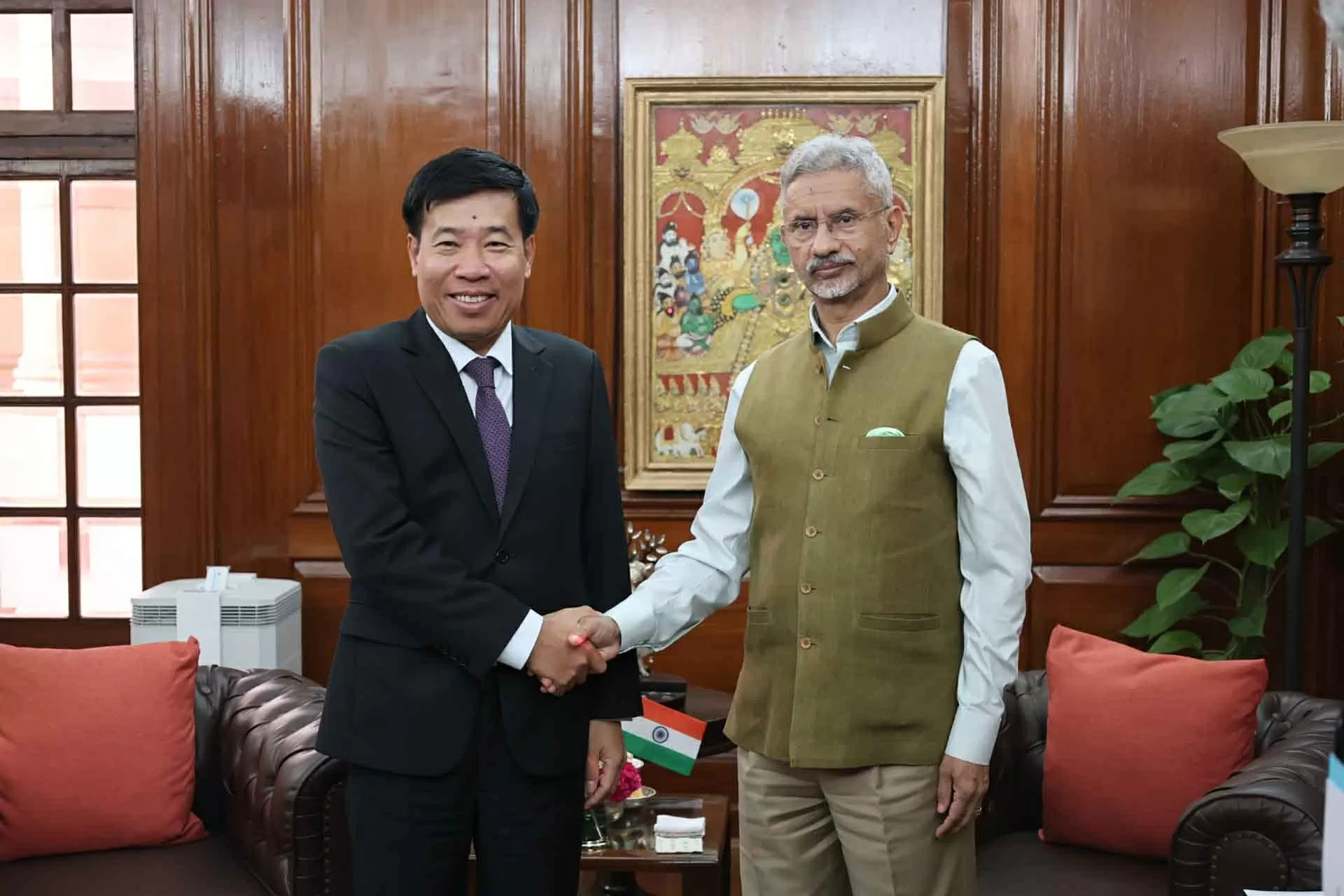 |
| Deputy Foreign Minister Nguyen Manh Cuong greets Indian External Affairs Minister S. Jaishankar on the occasion of co-chairing the 13th Political Consultation and the 10th Strategic Dialogue between the Foreign Ministries of Vietnam and India in New Delhi, June 25. (Source: PTI) |
New responsibilities in a new era
At the meeting with the Ministry of Foreign Affairs on August 29, 2024, General Secretary To Lam directed: "Vietnamese diplomacy must rise to new heights to fulfill new glorious responsibilities, worthy of being the "vanguard", a combined arm of the Vietnamese revolution, making important contributions to the cause of building and developing the country and defending the socialist Fatherland". The General Secretary also affirmed that diplomacy needs to contribute to strongly spreading the image of "Vietnam as an independent, self-reliant, peaceful, cooperative, friendly, developed, prosperous, and happy country".
Imbued with that spirit, all cadres and Party members of the Ministry of Foreign Affairs are determined to build a comprehensive, modern, and professional diplomacy on all three pillars of party diplomacy, state diplomacy, and people-to-people diplomacy under the direct, comprehensive, and absolute leadership of the Party. Closely coordinating with national defense and security, diplomacy will promote the "important, regular" role of foreign affairs, contributing to maintaining a peaceful and stable environment, creating strategic space and favorable conditions to serve the development goals of 2030 and 2045, constantly improving the country's position, making worthy contributions to world politics, the global economy, and human civilization.
We are looking forward to the 1st Congress of the Party Committee of the Ministry of Foreign Affairs with a new mission, new determination and new motivation. With the motto "Solidarity, innovation, breakthrough, responsibility, discipline", we firmly believe that the Congress will be a great success, opening the way for the successful implementation of the set goals and tasks, synchronously and effectively deploying comprehensive, modern and professional diplomacy on all three pillars of foreign affairs, contributing effectively to bringing the country firmly into a new era - the era of the Vietnamese people's rise.
Source: https://baoquocte.vn/trien-khai-toan-dien-nen-ngoai-giao-viet-nam-hien-dai-tren-ba-tru-cot-doi-ngoai-dang-ngoai-giao-nha-nuoc-va-doi-ngoai-nhan-dan-320964.html




![[Photo] Worshiping the Tuyet Son statue - a nearly 400-year-old treasure at Keo Pagoda](/_next/image?url=https%3A%2F%2Fvphoto.vietnam.vn%2Fthumb%2F1200x675%2Fvietnam%2Fresource%2FIMAGE%2F2025%2F12%2F02%2F1764679323086_ndo_br_tempimageomw0hi-4884-jpg.webp&w=3840&q=75)


![[Photo] Parade to celebrate the 50th anniversary of Laos' National Day](/_next/image?url=https%3A%2F%2Fvphoto.vietnam.vn%2Fthumb%2F1200x675%2Fvietnam%2Fresource%2FIMAGE%2F2025%2F12%2F02%2F1764691918289_ndo_br_0-jpg.webp&w=3840&q=75)
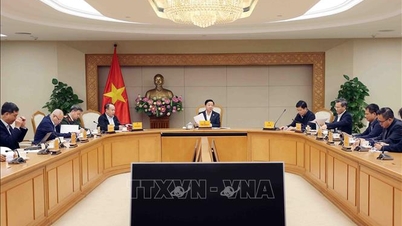

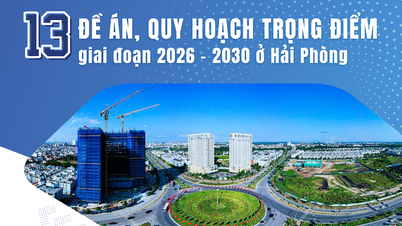

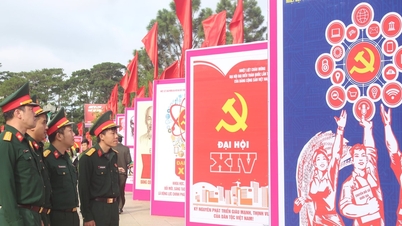

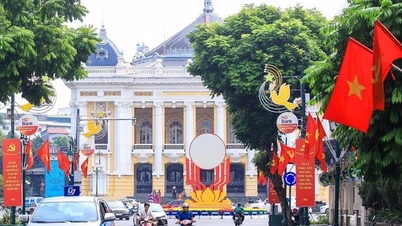

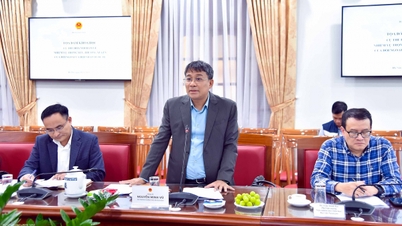
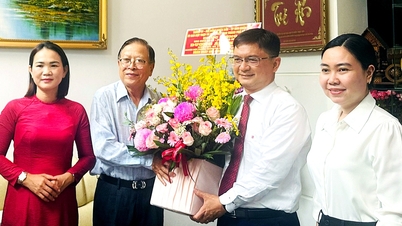




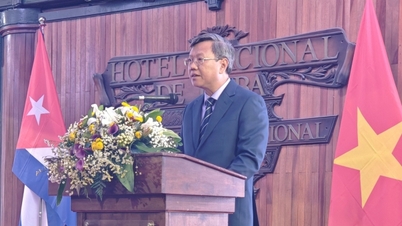
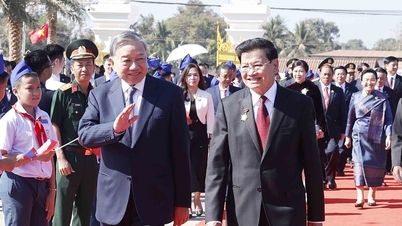
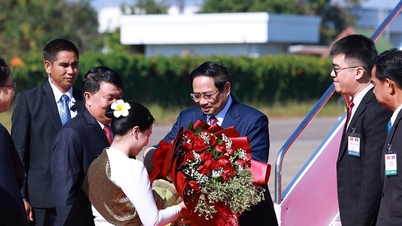
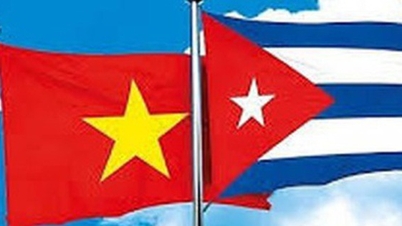





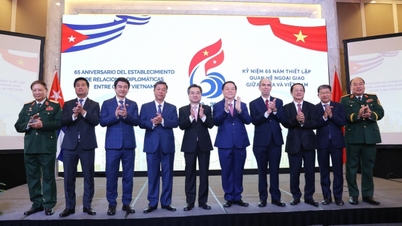
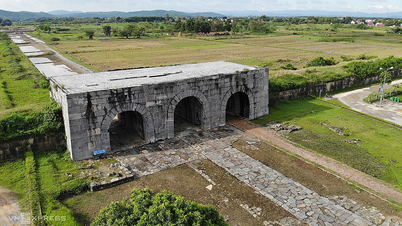
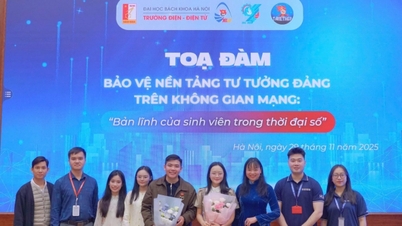
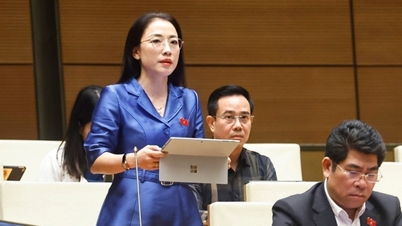
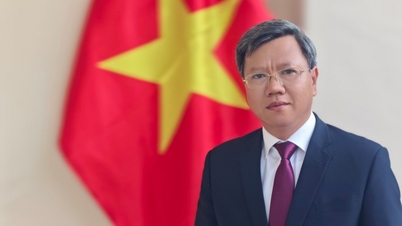
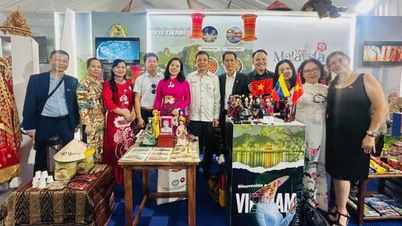







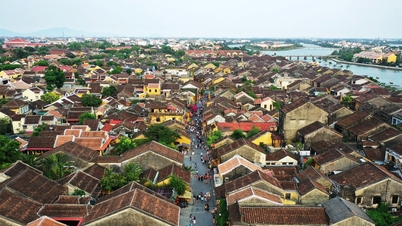

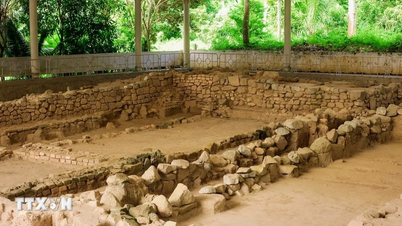

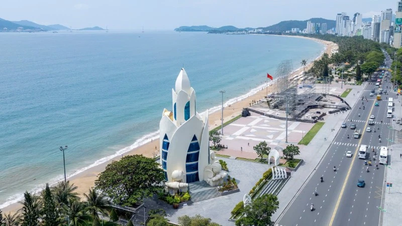




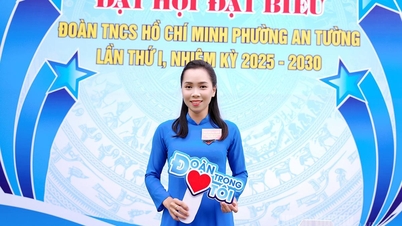

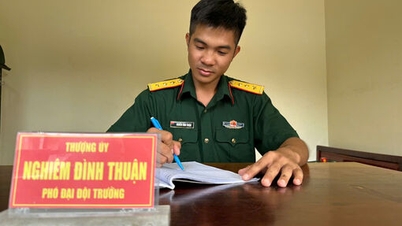

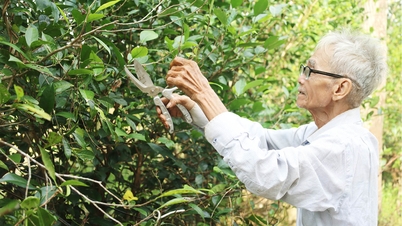

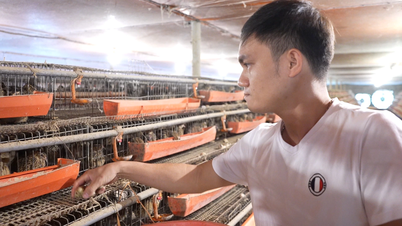


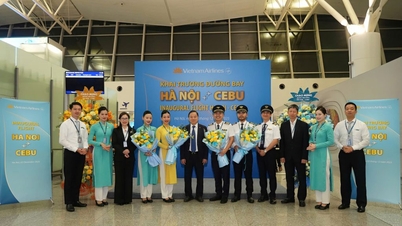


















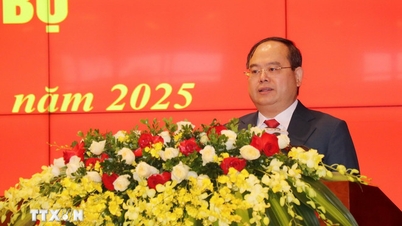
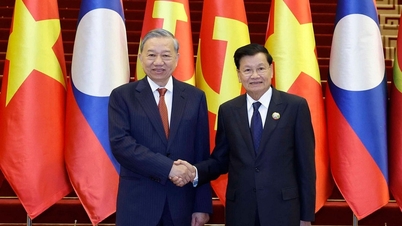

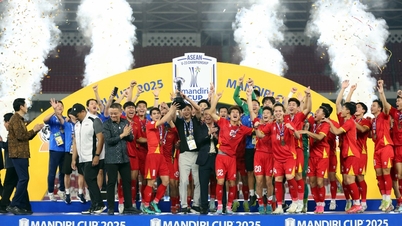


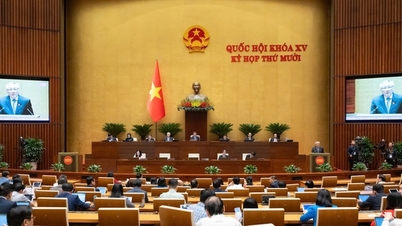


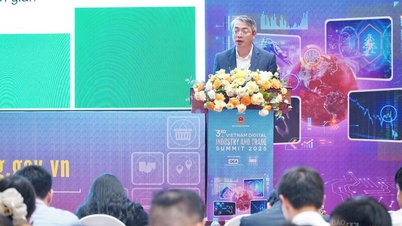

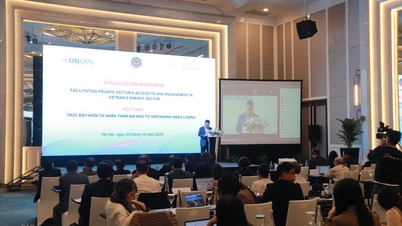
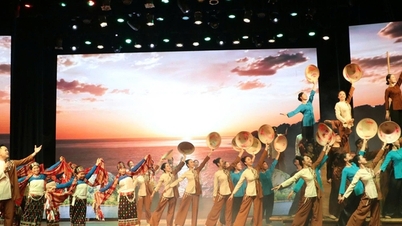
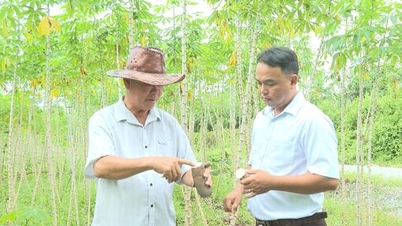


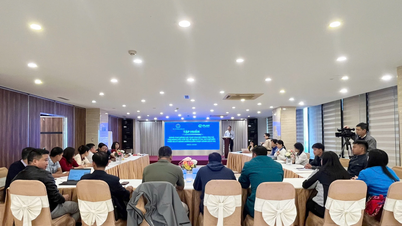




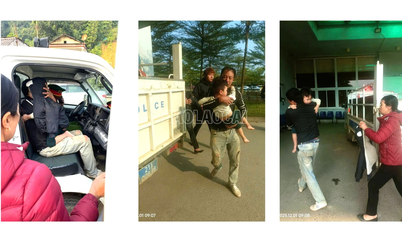












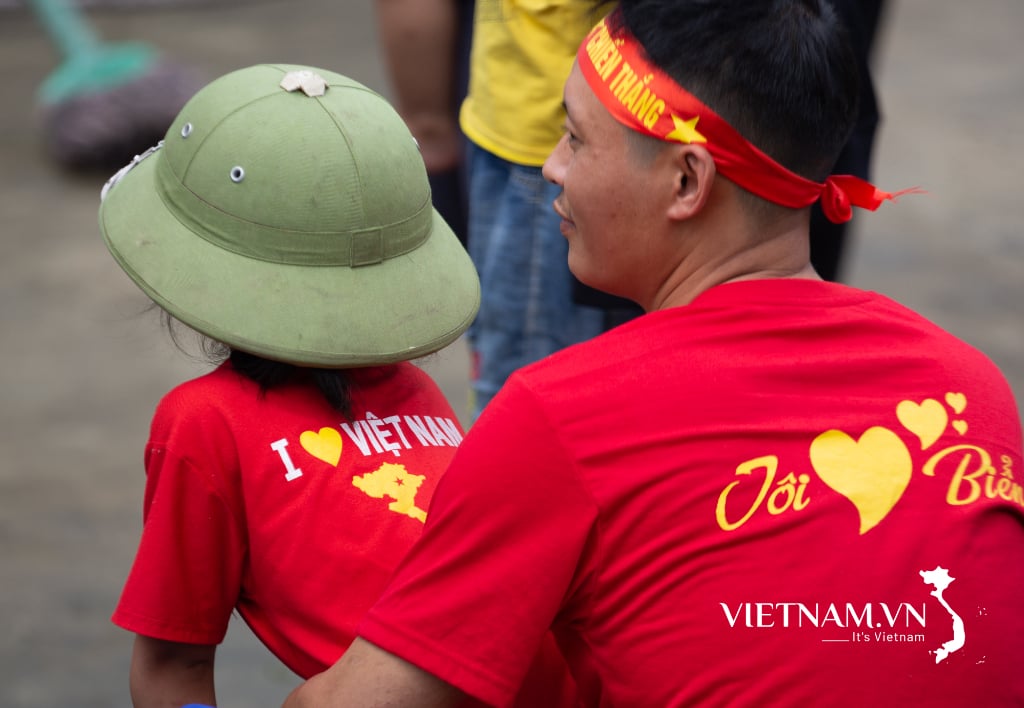
Comment (0)